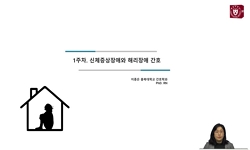The purpose of this study is to prevent the rights of the deceased and the bereaved families in the military from being infringed. Unlike in the past, military investigative agencies do not cover up deaths. Military investigative agencies are investig...
http://chineseinput.net/에서 pinyin(병음)방식으로 중국어를 변환할 수 있습니다.
변환된 중국어를 복사하여 사용하시면 됩니다.
- 中文 을 입력하시려면 zhongwen을 입력하시고 space를누르시면됩니다.
- 北京 을 입력하시려면 beijing을 입력하시고 space를 누르시면 됩니다.
https://www.riss.kr/link?id=A108544684
- 저자
- 발행기관
- 학술지명
- 권호사항
-
발행연도
2023
-
작성언어
-
- 주제어
-
KDC
300
-
등재정보
KCI등재
-
자료형태
학술저널
-
수록면
663-685(23쪽)
- DOI식별코드
- 제공처
-
0
상세조회 -
0
다운로드
부가정보
다국어 초록 (Multilingual Abstract)
The purpose of this study is to prevent the rights of the deceased and the bereaved families in the military from being infringed. Unlike in the past, military investigative agencies do not cover up deaths. Military investigative agencies are investigating more precisely based on a wide range of personnel and organizations. Military investigative agencies sometimes ask the bereaved families to agree to an autopsy even if an autopsy is not necessary to prevent questions from occurring about the death in advance.
However, despite the fact that the cause of death has already been clearly identified as suicide through a post-mortem examination, it is not reasonable to continue to persuade the bereaved families by saying that the investigation agency will arbitrarily find the truth. If the subjectivity of rights can be recognized by the deceased, it can be seen as a violation of the rights to the freedom of the body guaranteed by the constitution.
As seen in the recent death in Itaewon, the bereaved families who lost their loved ones fall into great sadness. Watching the moment of the bereaved families who actually experienced sudden suicide, it is difficult to have any conversation with the bereaved families, and the bereaved families often cannot judge rationally. Prior to the autopsy, a post-mortem examination is conducted to examine the exterior only with the eyes, and the bereaved family can also be present in this process. The bereaved family, who identified the body of the deceased during the coroner's admission, weeps even more. After the post-mortem examination, it is necessary to decide whether to do an autopsy, but it is questionable who can decide whether to do the autopsy.
As seen in the recent death in Itaewon, the bereaved families who lost their loved ones fall into great sadness. Watching the moment of the bereaved families who actually experienced sudden suicide, it is difficult to have any conversation with the bereaved families, and the bereaved families often cannot judge rationally. Prior to the autopsy, a post-mortem examination is conducted to examine the exterior only with the eyes, and the bereaved family can also be present in this process. The bereaved family, who identified the body of the deceased during the coroner's admission, weeps even more. After the post-mortem examination, it is necessary to decide whether to do an autopsy, but it is questionable who can decide whether to do the autopsy.
In order for an investigative agency to conduct an autopsy, it must correspond to a “critical management case” or a “autopsy consideration case.” The case in which the investigative agency needs to obtain consent from the bereaved families is that neither the “critical management case” nor the “autopsy consideration case” is applicable. In this case, the only way for the investigative agency to conduct an autopsy should correspond to the “death of the bereaved family raising suspicions about the cause of death” in the “autopsy consideration case”. In other words, it is not reasonable to conduct an autopsy even though the cause of death has already been clearly identified as suicide through a post-mortem examination and does not fall under either “critical management” or “autopsy considerations.”
동일학술지(권/호) 다른 논문
-
다민족 및 다종교 사회에 있어 공휴일과 중립성에 관한 헌법적 연구
- 연세법학회
- 김정수
- 2023
- KCI등재
-
- 연세법학회
- 전광석 ( Cheon Kwang Seok )
- 2023
- KCI등재
-
- 연세법학회
- 이종수 ( Jong-soo Lee )
- 2023
- KCI등재
-
- 연세법학회
- 김종구 ( Kim¸ Jong Goo )
- 2023
- KCI등재





 KISS
KISS






